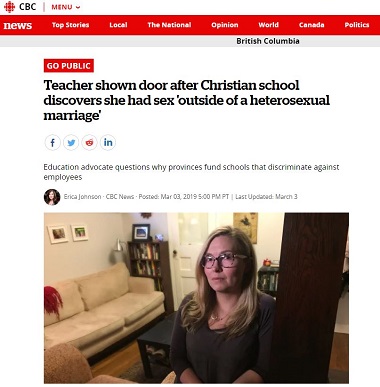 Our tax-funded broadcaster is going after tax-funded independent schools again.
Our tax-funded broadcaster is going after tax-funded independent schools again.
Throughout the day Monday (March 4), CBC radio hosts and news broadcasters highlighted a critical CBC report by Erica Johnson. Go Public had just posted “Teacher shown door after Christian school discovers she had sex ‘outside of heterosexual marriage.'”
The piece began like this:
A long-time teacher at Surrey Christian School in BC says she was told her contract would not be renewed after school administrators discovered she was living with her male partner, violating a clause in her employment contract that forbids “any sexual activity outside of a heterosexual marriage.”
“When you’re enforcing a policy like this you have to ask a teacher questions like, ‘Who do you live with? Where do you live? Are you sexually active? Are you pregnant? Are you gay? . . . It was humiliating,” Stephanie Vande Kraats told Go Public, tearing up as she recalled the meetings two years ago that led to her resignation.
Vande Kraats had worked at the school for almost 14 years as an English teacher and librarian.
She’s angry that her former employer receives half of its annual funding – $5 million – from the BC government when the school discriminates against employees.
Go here for the full story.
Early Monday morning, CBC Radio’s The Early Edition host Stephen Quinn asked Johnson to tell the story (the interview starts at 1:21:25).
Later in the show, Quinn brought up the issue with the show’s political panel (start at 2:11:27).
Then, for half an hour following the noon news (which itself referred to the Go Public report), BC Today host Michelle Eliot took up the campaign (start at 30:01).
By mid-afternoon, during On the Coast, a news reporter was delivering a response from Rob Fleming, the NDP’s Education Minister (start at 26:54). *1
Recurring theme
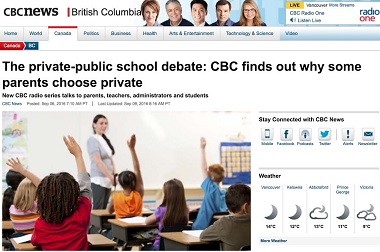 Back in the fall of 2016, I wrote Media debate falsely pits public versus private education, which covers some of the same issues:
Back in the fall of 2016, I wrote Media debate falsely pits public versus private education, which covers some of the same issues:
Private schools seem increasingly to be in the media’s crosshairs [particularly The Tyee, Vancouver Magazine and CBC]. . . .
All last week CBC’s On the Coast, The Early Edition and B.C. Almanac presented a series called Class System: BC’s public-private school debate. The coverage was somewhat balanced. Parents of independent school kids were interviewed, for example, but the overall tone was one of challenge to the private system.
(To get a sense of where On the Coast host Stephen Quinn is coming from, read his June 24 Globe and Mail opinion piece, Vancouver public schools face closure, yet we fund private school education.)
Quinn now hosts The Early Edition, and interviews others as they make the case against independent schools. Patti Bacchus, then-but-no-longer a Vancouver School trustee, has been vocally opposed to funding independent schools over the years (including in the 2016 series mentioned above), and was again sought out for the Go Public report.
Surrey Christian, FISA respond

Surrey Christian School superintendent Dave Loewen.
Erica Johnson did speak to Surrey Christian School:
Surrey Christian School superintendent Dave Loewen told Go Public, “it was sad” to lose Vande Kraats as an employee because she was a strong teacher.
“Having to have a difficult conversation with someone about personal choices is not my favourite thing to do,” he said.
He disagrees that the school’s community standards policy is discriminatory.
“I think the word ‘discriminates’ is too strong of a word,” said Loewen. “I don’t think it’s discriminatory because it’s not a requirement for people to work here. It’s invitational and we’re transparent about our values.”
Speaking with Michelle Eliot on BC Today, Loewen added:
I think what makes Canada beautiful is that reality, is that we name and honour and celebrate diversity. We’re a voice in that, with a particular world view, and we believe that that voice is part of the tapestry that makes up Canada, and we want to contribute.
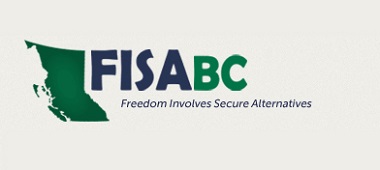 Johnson also got in touch with FISA BC, which represents a wide range of independent schools:
Johnson also got in touch with FISA BC, which represents a wide range of independent schools:
Surrey Christian School is a member of the Federation of Independent School Associations (FISA), which told Go Public in an email, “Independent schools save taxpayers nearly $430 million a year in operating costs and many millions more in capital costs” because parents pay tuition.
The email included a reference to United Nations Article 26, which covers education, along with the pertinent Section (41) of the BC Human Rights Code:
(1) If a charitable, philanthropic, educational, fraternal, religious or social organization or corporation that is not operated for profit has as a primary purpose the promotion of the interests and welfare of an identifiable group or class of persons characterized by a physical or mental disability or by a common race, religion, age, sex, sexual orientation, gender identity or expression, marital status, political belief, colour, ancestry or place of origin, that organization or corporation must not be considered to be contravening this Code because it is granting a preference to members of the identifiable group or class of persons.
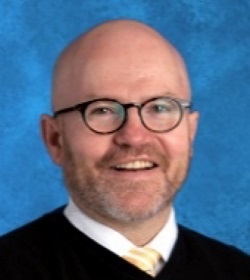
Shawn Chisholm, from his time as principal of St. Ann’s Academy in Kamloops (2017).
Asked by Eliot on BC Today how he would respond to Vande Kraats’ belief that the schools’ actions were discriminatory, FISA executive director Shawn Chisholm said:
Well, I don’t see how that is. I know that Surrey Christian communicates their values. Certainly this teacher has worked at the school for quite a few years, and was aware of those community standards. Things changed for her, but those standards did not change. It’s part of a contract that they had. . . .
I can understand that some people will not support the beliefs of Surrey Christian School, but [it’s] wonderful that we can disagree respectfully, and allow each other to have our different beliefs and values and traditions.
FISA represents “a wide range of faith-based and pedagogical perspectives, including Catholic, Protestant, Jewish, Islamic, University Prep (Advance Placement & International Baccalaureate), Indigenous, Montessori, Waldorf, Special Needs and Distributed Learning programs.”
Political outlook
Politicians are responsive to public pressure, and it seems to me that there is a considerable portion of the population that simply believes, with Patti Bacchus, that public money shouldn’t go to private education – let them build their own schools if they like, and pay for them, without provincial help. No need to worry about religious freedom rights under the Charter, strong results from private schools or the fact that the independent system saves money for the public system.
As part of the CBC series in 2016, Gloria Macarenko put it this way:
You know, this week we’ve heard from so many parents. They’re saying that we’re subsidizing schools that they can’t afford to send their children to, while their child’s school may be losing programs or facing closure, so how is private school funding fair to them?
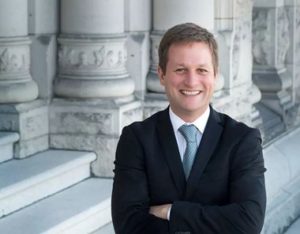
Rob Fleming is the NDP’s Education Minister.
Rob Fleming (then education critic for the NDP, now Education Minister) responded:
I guess you get the argument from private school parents too, who say, look I’ve paid taxes for everybody else’s kids and get, in some cases, a 50 cent dollars [independent school students receive up to 50 percent of the per-student grant allocated to public schools] in order to send my kid to a local parish school. So everybody contributes to the dollars that go into the public system and the lesser amount that goes into the private system.
When the NDP came to power in mid-2017, their approach to private schools seemed fairly benign. In July, I wrote Future of independent schools looks secure under new Education Minister, referring to several positive comments by Fleming about independent schools.
I also quoted from a letter John Horgan sent to Peter Froese, then executive director of FISA, shortly before taking on the role of premier:
B.C.’s New Democrats fully support a parent’s right to choose the education stream for their children, whether it be in independent, faith-based or public schools. We recognize each family has different needs and believe they have the right to choose the school that best suits those needs. We do not have any plans to change the existing funding for independent schools nor the legislation that governs this funding.
However, things do not look quite so rosy at the moment.
By the time CBC Radio’s On the Coast show aired on the afternoon of March 4, reporter Tanya Fletcher had managed to get Education Minister Rob Fleming to respond to the Go Public report (at 26:54 and other points). The report, she said, “has left critics questioning why the provincial government continues to fund schools they claim discriminate against employees”.
Fleming pointed to legal protections under the right to religious freedom:
Well, I think we’re still stuck with the courts having ruled that certain human rights exemptions allow contracts to be structured in this way, and two parties sign them . . .
He also said he’s hoping this will be a case for BC’s new Human Rights Commissioner to review:
. . . to look at the issues around employment conditions, make recommendations to the Attorney General and our government. We’re lucky to be in a position where we’re creating that office; MLAs are hiring that position right now.
When Vande Kraats asked the BC Human Rights Tribunal [which is different from the BC Human Right Commission] about her situation, she says she was dissuaded from filing a case.
“They were very sympathetic,” she says, but told her that religious schools have the legal right to have discriminatory employment clauses. . . .
Vande Kraats also wants the B.C. government to cut funding or demand religious schools change their employment policies.
So, the issue is back in the political realm. To get a good sense of which way the wind is blowing, check out Stephen Quinn’s discussion with his provincial political panel (start at 2:11:27).
Asked “whether faith-based schools should be given taxpayers money even if they are accused of discrimination,” Amy Robichaud (Liberal), Moe Sihota (NDP) and Nicola Spurling (Green) seemed to be in agreement that independent schools ought to be able to receive public funds, but only if they eschew some of their ‘discriminatory’ practices’ and abide by ‘contemporary values.’
A March 4 media release (‘B.C. Green Caucus: Surrey Christian School Teacher Firing Deeply Concerning’) from the Green Party confirms that Surrey Christian and FISA can’t expect much support from that quarter.
The following thoughts from my 2016 comment still seem pertinent:
An issue for the church?

Sienna and Nala Cummings in front of the newly completed Vancouver Christian School on opening day, September 4, 2018.
So, does the debate about private/independent schools really matter for the church? Yes, for at least a couple of reasons:
1. There are several Catholic schools and a couple of Protestant schools within the city of Vancouver – and many more up the Valley and around the province. They have been built with a lot of blood, sweat and tears by parents who want their children to be taught in a way consistent with their faith.
2. The second reason is closely related to the first, and was expressed well by Peter Froese [executive director of FISA until last fall], when asked why people choose independent schools:
What we’ve been told by parents is that one of the main reasons is that it’s a choice, and it’s a choice because the values of the home are consistent with the values of the school. One of the issues for parents who might want to choose a public education – and by the way, we have a very good public education system in British Columbia, and it should be appropriately funded . . .
But the issue is that under Section [76(1)] of the School Act, public schools are restricted in terms of focusing exclusively on secular values and non-sectarian principles. For many families, they would prefer to have an environment for their kids where their kids can feel safe, where the values of the home are taught in the school.
And so you will see, in this province, where choice in education is available, 60 percent of the independent schools in the province are faith-based to some extent. and you will see a variety of faiths represented, and that appeals to a lot of families. When we ask the families, why did they choose an independent school, they cite that as one of their main reasons – the fact that their faith values are not able to be recognized in the public sector, whereas they are in the independent schools. . . .
How should we respond?
Most Metro Vancouver kids go to public schools, and there is no reason to think that will change any time soon. Many churchgoers are public school teachers or in other ways involved with the public system.
So, what kind of approach should Christian parents, and churches, be taking?:
1. Demand a strong public school system. Our education is the envy of the world and must be vigorously supported. Demand adequate money for the system. . .
2. Keep in mind that the public system is required to be ‘secular and non-sectarian.’ There will be no opportunity to change that wording in the foreseeable future, but neither is it written in stone. The system could become more amenable to other worldviews – or not.
3. In the meantime, we have a dynamic independent system, supported by both main political parties – though not, I would say, by the media, nor even by most of the public, given that what it knows about the topic often comes through the media. So, it is important that churches and individual Christians stand up for the independent system now, while its legitimacy is being questioned.
I would add one more point now:
4. Keep an eagle eye on the provincial government. The NDP may continue to support independent schools in theory, but seems hopeful that the newly-formed Human Rights Commission will do their dirty work and gut the schools of some of what makes them unique.
A March 6 comment by Ottawa constitutional lawyer Albertos Polizogopoulos on the Convivium site is well worth reading too. In Association not Discrimination, he makes the case that “A BC faith-based school’s dismissal of a teacher for sexual conduct contrary to its standards is neither shocking nor discriminating. In fact, it’s protected by Charter of Rights rulings that date back to 1984.”
*1 I do want to point out that I’m a very regular CBC listener. Every day I listen to Stephen Quinn on The Early Edition, Michelle Eliot on BC Today and Gloria Macarenko on On the Coast. Not to mention regular newscasts throughout the day, and As It Happens in the evening. I appreciate most of what I hear – the hosts are all very skilled and knowledgeable. Though I don’t always agree with their approach, that would no doubt be true of any listener.
Sometimes, though, I feel as though I am listening to CPC (Canadian Propaganda Corporation) rather than CBC (Canadian Broadcasting Corporation). Hosts are sometimes too inclined to talk with like-minded people about people with whom they disagree. The latter group may get bit parts but they are seldom the main players.

I’d like to recover a sense of balance on the word “discrimination.” It’s become a word of repugnance, when in its purest sense it still means having the ability to choose between competing values and interests. That is what organizations of all kinds including private schools do every day, and it’s protected under Article 2 of the Constitution.
There are lots of people I choose not to associate with for the protection of my peace of mind, property, or family and friends, and I’m not insulted if someone says I’m discriminating – of course I am! The point is I do not do it except for good reason.
So too have private schools, among other aged institutions, been discriminating. The values promoted are up-front and public. While there may not be choice in what schools a child may attend, there are in what schools an employee may work at, and reasonable and even-handed restrictions for public purposes should always be valid reasons for discrimination.
That it’s become a pejorative word in society is a tragedy, and one that this article has gone some way toward recovering, but the greater shame is on those who throw it around.
Very unfortunate for the teacher and I suppose the conditions for her termination does kind of grate with modern values; however, she knew what she was getting into, didn’t she? We live in an era where parental authority is being eroded at every turn – so while I might have progressive values, I must support the right of communities to maintain their own values. There are lots of public schools she can teach at and she will be welcomed there with open arms.
Having said that, private schools must be careful about overly dallying with government agencies – if you take government money then you are rather on the hook, aren’t you? I think, even though I’m pro-vaccine, private schools should be careful about having say “immunization clinics” because you’re inviting in a government agency, aren’t you? Leave it to the parents to get their children their shots with their own family doctors.
It’s difficult to “impose values,” isn’t it? It’s better that love leads the way – both in public and private spheres. So many public schools right now are such difficult places to be, you can’t blame parents for turning to the private system. Thanks for the article.
. . . Stephen Quinn’s discussion with his provincial political panel . . .
Asked “whether faith-based schools should be given taxpayers money even if they are accused of discrimination,” Amy Robichaud (Liberal), Moe Sihota (NDP) and Nicola Spurling (Green) seemed to be in agreement that independent schools ought to be able to receive public funds, but only if they eschew some of their ‘discriminatory’ practices’ and abide by ‘contemporary values.’ . . .
I think right there is the rub. Public offices feel they have the right to force religious organizations to adapt their religious values to “contemporary values.” Retaining one’s religious values IS the entire basis of religious freedom.
I appreciate your balanced editorial.
I think the common argument about “taxpayer dollars” to fund Christian school is misguided. They forget that BOTH believers and non-believers pay taxes. Unless of course, they say that all Christians are exempt from paying any tax.
Excellent article giving us all sides of the debate in a responsible informative way. I’m surprised you as a journalist in today’s journalistic milieu aren’t said to be discriminating against biased emotional rhetoric and faulted for being balanced. It seems tragic that those claiming diversity are the most narrow minded and judgemental.